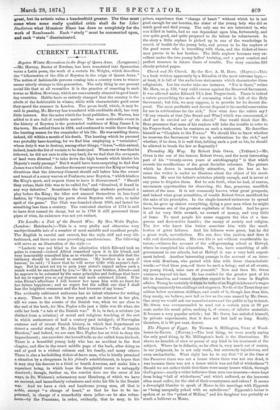The Plagues of Egypt. By Thomas S. Millington, Vicar of
Wood- house-in-Raven. (Murray.)-r-The best thing, we were nearly saying the only good thing, in Mr. Millington's book is the illustrations. He shows no breadth of view or power of any kind in his treatment of the subject. Where he is didactic, as he often is, very much out of season, in our judgment, he is not only weak, but extremely injudicious, and even uncharitable. What right has he to say that "if at the time of the Passover there was not a house where there was not ono dead, it was because there was not a house which was not full of wickedness"?
Should we not rather think that there were many homes which, through God's grace—surely a wider influence than man can measure—were kept
from being "full of wickedness," and which suffered, as the innocent often must suffer, for the Binh of their countrymen and rulers ? It seems a downright blunder to speak of Moses in his marriage with Zipporah as "being unequally yoked with an unbeliever." Zipporah's father is spoken of as the "priest of Malan," and his daughter was probably as much a believer as Moses.


































 Previous page
Previous page